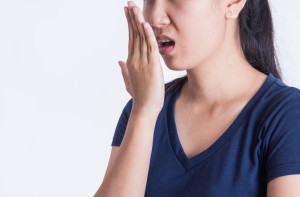In Latin, halitosis means “breathed air” … “pathologically altered breathed air.” It sounds intimidating, so we’re going to break it down to causes and cures. Breathe in, breathe out, you got this.
The Stats of Stink
According to the National Institutes of Health, half of us have bad breath; not blame-the-garlic bad breath, but a regular battle with keeping our breath fresh. The good news is that when you know the cause, you can typically manage it.
Oral Hygiene
When flossing one’s teeth lose out to crashing out, when replacing a thorough brushing with using some mouthwash becomes habit, things pile up. “Things” being bacteria, mainly. It’s hard to estimate how much of one’s person bad odor is simply coming from unbrushed teeth and unflossed gums, but we know it’s a lot.
Think of your gums as swimming pools and the food you eat as the leaves that fall into the pool. If you don’t run the underwater vacuum regularly, the leaves not only pile up, they break down and become part of the water, too. After one of your two daily brushings, floss your teeth and rinse really well with water or even mouthwash, preferably a non-alcoholic one. Your halitosis issues will be readily solved.
Foods And Lack Thereof
The foods we eat don’t just react to bacteria in our mouth, they react to bacteria, enzymes, acids and other things in our stomach. Nature didn’t make those things to smell nice, it made them to accomplish a task–break foods down. Naturally, this means some foods are going to break down differently and smell differently than others. Onions, garlic, sugar … these are some classic examples of foods that will make the air you breathe out more pathological than normal. Be cognizant of the foods that make your insides more and less stinky, keep good hygiene, and drink plenty of water, and your halitosis should be kept mostly at bay.
If you think eating less or starving yourself before some event is the answer, think again. All that does is allow your stomach acids to brew without anything to do. You’ll probably breathe out air that’s even more noxious.
Conditions And Diseases
Certain diseases and conditions like diabetes or lung infections can create environments inside your body that trigger harsh odors coming out of your body in the form of halitosis. When hygiene and food intake do not seem to be contributing factors to bad breath, it’s time for a consult with a physician. Something more serious could be developing.
Sinus Stuff
Bad breath doesn’t just come from your mouth. Sometimes it’s coming from the amazing network of tissue and bones and cavities (passageways not the holes in your teeth) that make up your sinuses. Our sinuses have mucous at the ready to fight off viruses and other invaders that make us sick. None of it smells great, so at some point your immune system may contribute to your bad breath.
Meanwhile, there’s also your tonsils at play. Tonsils are a sort of filter for your lymphatic system. They have little pockets and bacteria can get stuck there, for a long time. They are called tonsil stones and they can be hard to remove with normal rinsing. They also smell like something crawled into the back of your throat and died.
The dental community suggests removing them by gently brushing them out with a cotton swab, like a Q-tip. Be careful not to press too hard. Another tonsil cleansing method is water irrigator used at a low constant pressure.
Bad Breath Buddies
It’s hard to know sometimes–until it’s too late–if you have bad breath. So, having someone reliable you can check with is a valuable weapon in the halitosis fight. Whether you have a pal like that, don’t despair. Your dentist can be your bad breath buddy, too. Come in for regular cleanings and exams and have a conversation about your halitosis status. Your conversations and kisses will shine like your teeth.








Leave a Reply